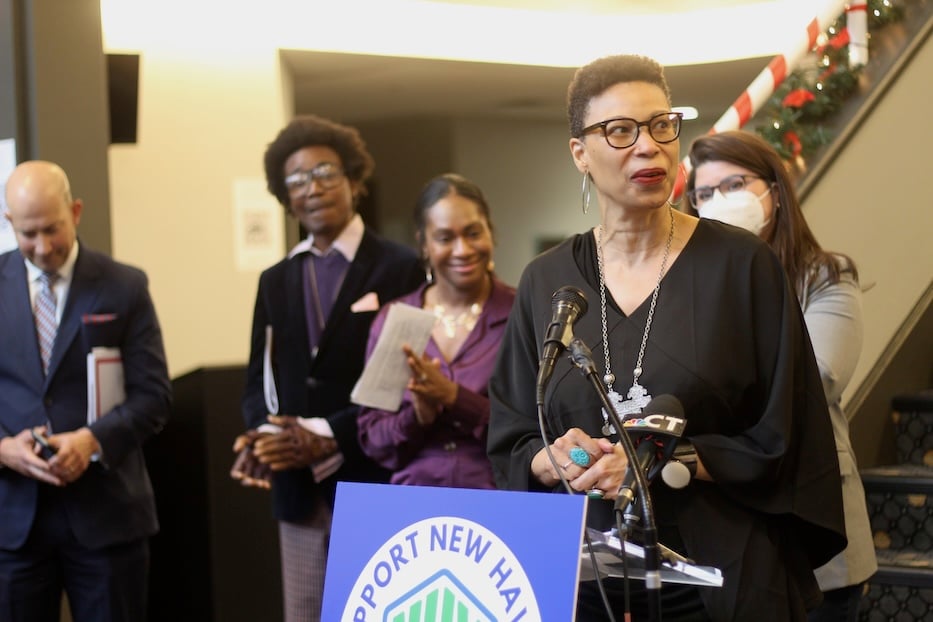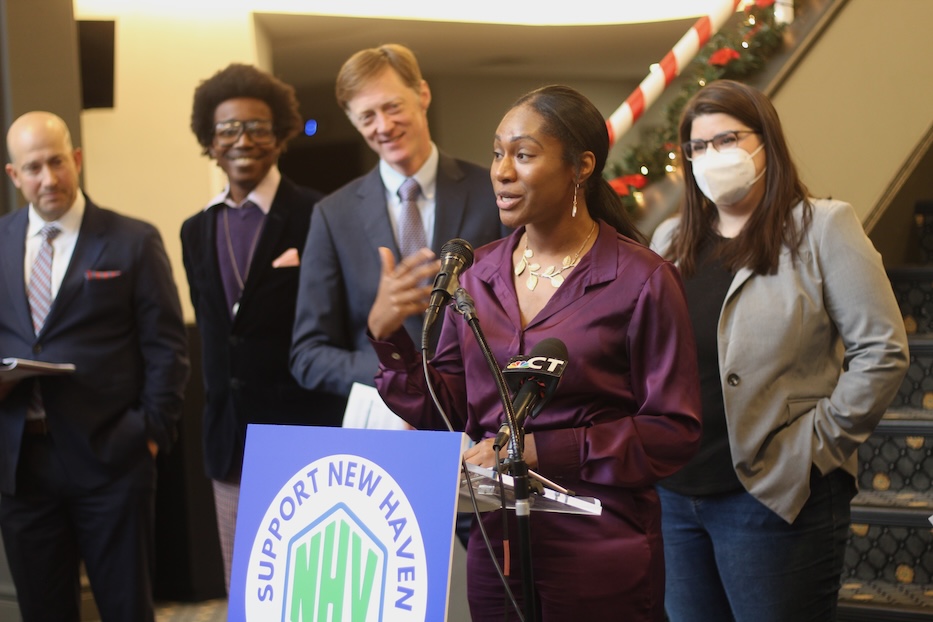
Culture & Community | Economic Development | Arts & Culture | Theater | Christmas | Shubert Theatre
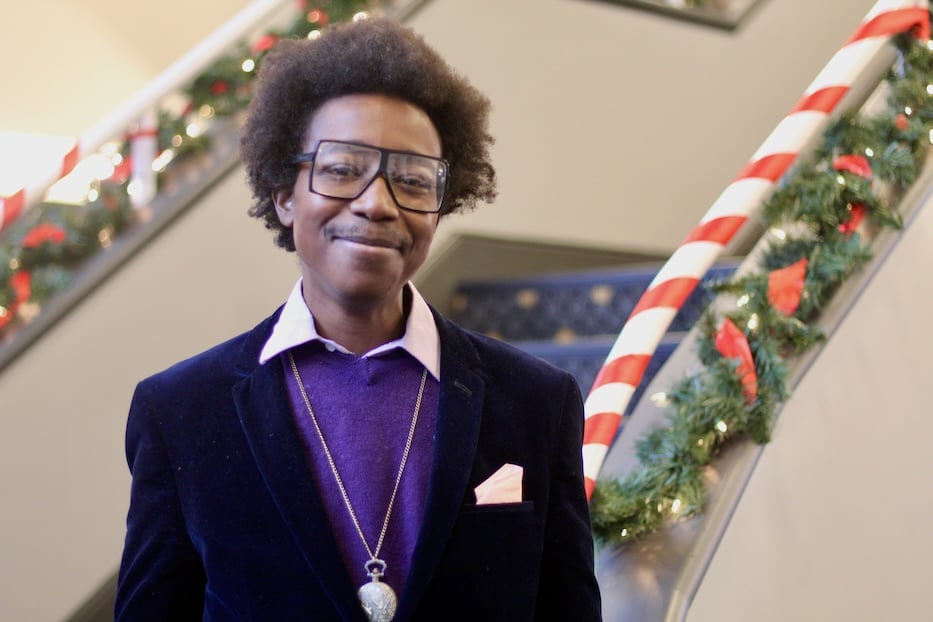
Artist Kwadwo Adae: “There is gold in each neighborhood. This city is full of kindness. So whatever your favorite thing is, whatever type of organization speaks to you, please patronize those businesses.” Lucy Gellman Photos.
Buy tickets to an upcoming play, or copies of the new Zadie Smith novel at a favorite local bookstore. Carve out an afternoon to cheer on pint-sized toy soldiers and sugar plum fairies in New Haven Ballet's The Nutcracker. Take a cocktail-making class on College Street, or learn to paint at a sun-splattered studio on State, or make a date to dance among the dinosaurs when they arrive downtown in the new year.
Those were just some of the suggestions from arts leaders, artists, and city and state officials Thursday afternoon at the Shubert Theater, as they encouraged New Haveners to buy local—and championed the economic power of arts and culture—during the holiday season. Posed against evergreen boughs, twinkling white lights and handrails wrapped in red and white decor, speakers outlined a holiday season filled with art, from performances of Chicago at the Shubert to painting classes they can sign up for in East Rock.
The gathering, held just hours before the first night of Hanukkah, doubled as a chance to celebrate the results of a $4.99 million state grant to the Shubert Theatre and of AEP6, the most recent Arts and Economic Prosperity study from Americans for the Arts. When it was released earlier this year, the study showed that arts and culture made up a nearly $1 billion industry in Connecticut, with over 20 percent of that stimulus coming from the Greater New Haven region.
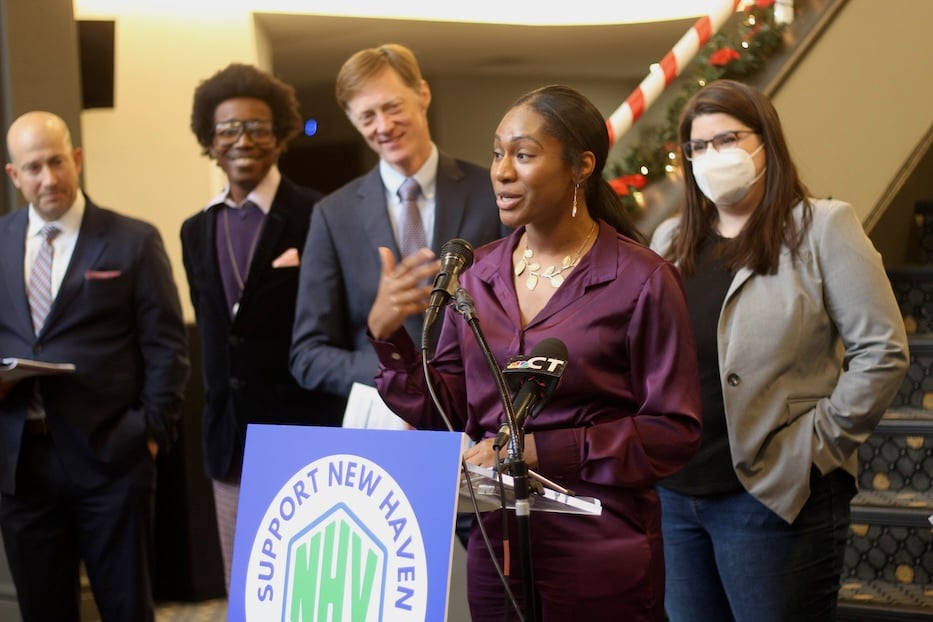
"It's exciting that we have data that supports the thing that we are always screaming from the rooftops."
"We talk about the arts being a social driver. We talk about the arts being a connector of community and uniting people. All of these things are very, very true,” said Cultural Affairs Director Adriane Jefferson. “We don't often, however, talk about the massive economic contribution of arts and culture in our country, in our state, in our region and in our city. And so it's exciting that we have data that supports the thing that we are always screaming from the rooftops."
While the arts are life-giving, they are also helping to bring New Haven’s economy back after the Covid-19 pandemic (read more about AEP6 results in a prior Arts Paper article here). In 2022, the arts and culture sector generated a total of $954.1 million in the state, including $143.4 million in the city of New Haven alone.
That includes $118.3 million in spending by arts and culture organizations, and another $25.2 million in “event-related expenditures”—things like hotel rooms, restaurant meals, post-show drinks, popcorn or candy to accompany a movie screening, and the cost of childcare for a night on the town. Last year in New Haven, there was a $9 return on investment for every $1 spent directly on the arts.
What that means in numbers is 2,042 jobs and $34.2 million in tax revenue, Jefferson said. In other words, “We are trending up and we are going in the right direction.”
“If you buy an experience in New Haven, that dollar is going towards the staff that are from New Haven,” added Mayor Justin Elicker, who said he's especially excited for an upcoming performance of Annie at the Shubert at the end of February. “And they take that dollar and spend it on restaurants that are in New Haven. They spend it at the grocery store in New Haven. And those people earn a dollar because of their work there, and then spend that somewhere else in New Haven. So buying local is so key to our vibrant economy.”
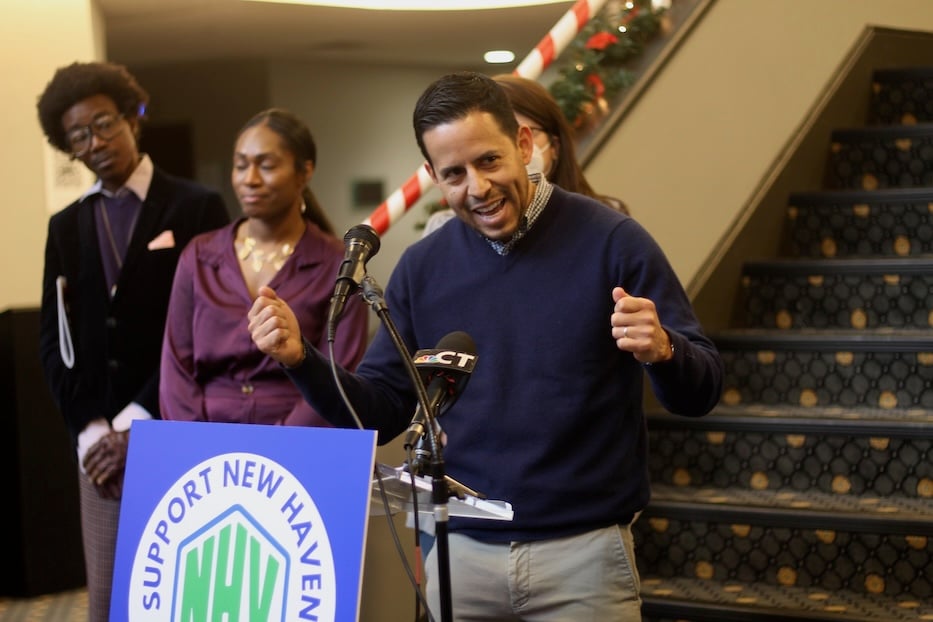
Jacob Padrón, the artistic director of Long Wharf Theatre, raised his arms in victory as he described a sold-out run of The Year of Magical Thinking.
As they took their place at a podium, speaker after speaker echoed that message, some with holiday-adjacent suggestions in tow. Jacob Padrón, the artistic director of Long Wharf Theatre, encouraged New Haveners to support “the artistry that is happening right here locally,” from Long Wharf’s sold-out performances of The Year of Magical Thinking to Arthur Miller’s A View From The Bridge, scheduled for February 10 through March 10 of next year at the Canal Dock Boathouse. He pointed to the theater’s new itinerant model as opening up a season of new possibility in the region.
“We are telling stories and creating experiences in different parts of the city,” Padrón said, thanking collaborators that include the City of New Haven. “We believe that the city and the region have many stages. So we are bringing theater to the people, to this community, and we are grateful that you are on that journey with us.”
He was the first of many to do so. Carla Jackson, assistant dean and general manager at the David Geffen School of Drama and Yale Repertory Theatre, suggested that attendees make time for the world premiere of The Salvagers, running at the Yale Rep through December 16. Dr. Keith Churchwell, board president for the New Haven Symphony Orchestra, recommended the symphony’s upcoming “Holiday Extravaganza” and performance of Handel’s Messiah.
Jackson, who invited attendees to come visit her at the Yale Rep.
Public artist and painter Kwadwo Adae, who runs an art school on State Street, piped up on behalf of small, arts-focused businesses and for-profit institutions, which are often operating on much thinner margins than their patrons realize. He stressed the importance of backing businesses in every corner of the city, from Newhallville to Fair Haven to West Hills.
“Without ears and eyes and mouths, our musicians can’t play,” he said. “Our culinary artists that are so talented in this town, they don’t have anyone to eat and to enjoy what is being created. And without eyeballs, my art is meaningless to everyone here. So I really encourage everyone to go and make sure that your Possible Futures, and your BLOOMs, and your NXTHVNs, your Westvilles, your [West] Hills [are supported].”
“There is gold in each neighborhood,” he added. “This city is full of kindness. So whatever your favorite thing is, whatever type of organization speaks to you, please patronize those businesses.”
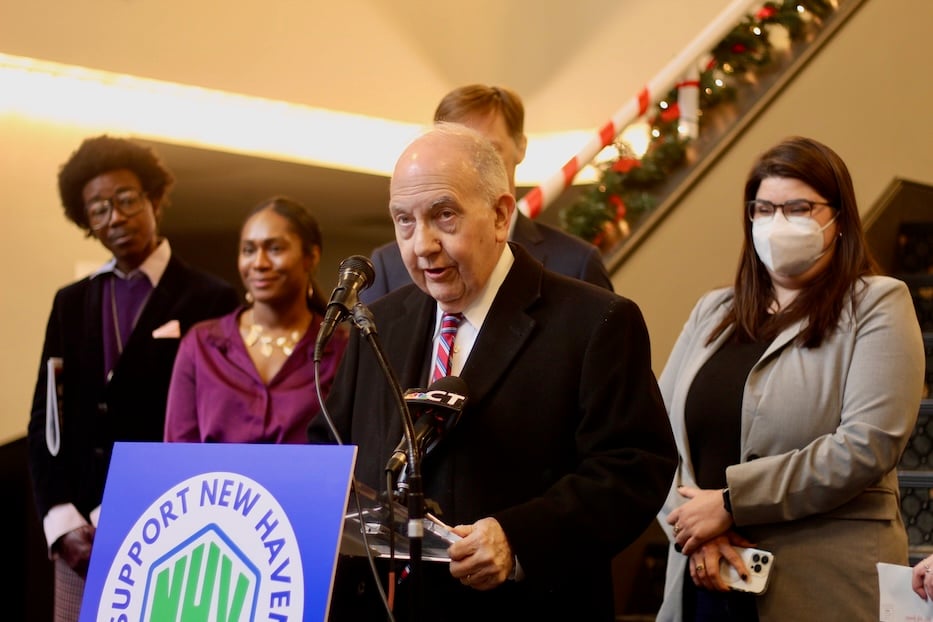
State Sen. Martin Looney.
Calling New Haven “a beacon for the arts of all kinds,” State Sen. Martin Looney noted the importance of investing in institutions like the Shubert, which earlier this year was awarded $4,993,489 from Connecticut’s Community Investment Fund 2030 (CIF) for a number of “sustainability projects."
Those include new HVAC, lighting, and sound equipment and much-needed renovations on the College Street building. He pointed to the theater’s survival within a rich arts landscape that also includes Long Wharf Theatre, now in its first season of itinerancy, and the Yale Repertory Theatre among others.
“While people cite the dollar figures, the ancillary value, that arts and cultural programs bring in, I think we have to primarily cite the value of art in itself, whether it’s performance or representational art,” he said. “Art is something that ennobles the human spirit, and it should be talked about independently of financial aspects that it brings.”
.jpeg?width=933&height=622&name=CityPresserDec23%20-%201%20(1).jpeg)
Kelly Wuzzardo, director of education and engagement at the Shubert.
Arts workers like Kelly Wuzzardo, director of education and engagement at the Shubert and a new member of the city’s Cultural Affairs Commission, often see that impact in real time. This week, a touring production of Chicago at the theater has provided work for 60 local stagehands, all members of International Alliance of Theatrical Stage Employees (IATSE) Local 74. Meanwhile, it has also boosted downtown hotel and restaurant revenue as Chicago cast and crew members arrive in New Haven.
Then there’s ticket revenue, Wuzzardo said. This weekend, the Shubert is expecting 1600 patrons to pass through its doors. Many of them will have eaten and shopped downtown beforehand, or might stay for a cocktail or dessert after the show. That continues all month and into January, with performances of The Nutcracker, A Christmas Carol, and then Dinosaur World Live in January.
She mentioned a photograph that Shubert staff often refers to, of a struggling College Street lined with boarded-up buildings in the 1970s. When Covid-19 hit in March 2020, “that was very hard” for the arts, she said. Theaters, with other arts venues, became some of the first to shutter and the last to reopen. Now, they are part of the vibrant and evolving arts ecosystem that is bringing the city's economy back.
“Everything we do, we consider ourselves kind of a lynchpin in this neighborhood for economic development," she said. "And we are so grateful for the support that will allow us to continue to do that."


